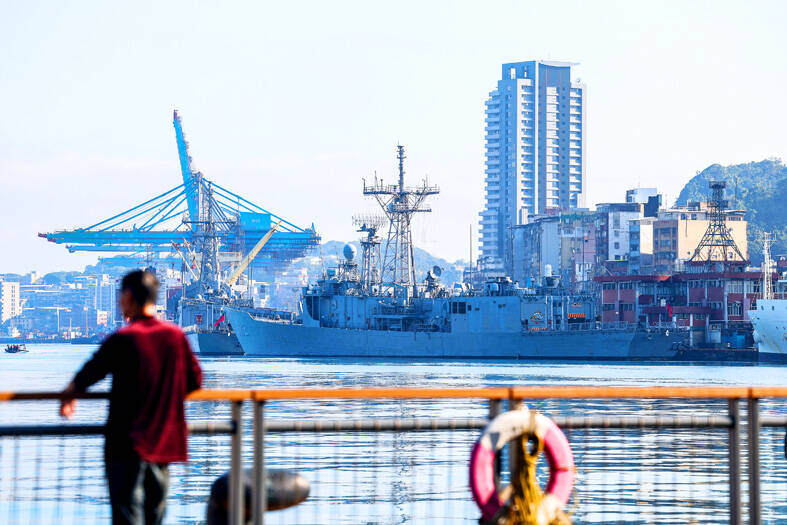Beijing’s recent naval exercises have left Taiwan and the US “struggling” for a response as the two nations drew different conclusions about the implications of the Chinese military drills, the Financial Times (FT) reported on Sunday.
Taiwan has been bracing for China to hold military drills to retaliate against President William Lai’s (賴清德) diplomatic visits abroad, the outlet said, referring to Lai’s Nov. 30 to Dec. 6 tour to Taiwan’s three South Pacific allies, which included stopovers in Hawaii and Guam.
Beijing announced partial air traffic restrictions across seven time zones along its coast from Shanghai to Hong Kong over two days.

Photo: I-hwa Cheng, AFP
Yet, the Chinese People’s Liberation Army (PLA) has issued no statement about the drills, in a major departure from its practice of launching propaganda campaigns to accompany military exercises targeting Taiwan, the FT said.
Taipei and Washington have drawn “drastically different conclusions” about the meaning of Beijing’s latest military activities, it said.
On Monday last week, the Ministry of National Defense established an emergency response center, saying that “no matter if they have announced drills, the level of the threat to us is severe.”
In contrast, the US said that the Chinese military activity in the region was “elevated” in a continuation of the broader trend of the past several years and “consistent” with levels observed in recent exercises.
The newspaper cited US officials as saying that they do not see the drills as a response to Lai’s short visits to Hawaii and Guam.
The FT quoted a senior US official as emphasizing the importance of distinguishing a coercion campaign targeting a transit from the type of “routine large regional exercise” that appears to have occurred.
“They made a choice not to execute a pressure campaign in response to the Lai transit,” the official said, adding that China might have decided to not specifically respond to Lai’s transit because it was “low profile.”
Taiwan might have become more alarmed because its ability to detect and track Chinese military activities has improved, the senior official said.
Washington has not asked Taipei to dial back the rhetoric in recognition that Taiwan might have domestic political considerations, they added.
It was possible that Beijing did not want to spark tensions during the US presidential transition or avoid calling attention to the military amid the conduct of anti-corruption probes into the PLA, the FT said.
The divergent messaging is a sign of the difficulties for Taiwan, the US and allies to assess Beijing’s intentions and mount a response against China’s use of its rising military strength in a “creeping pressure campaign” against multiple neighbors, the newspaper said.
China’s combination of traditional and unannounced drills could be a deliberate tactic to “sow confusion and uncertainty” among its foes, it cited observers as saying.
Regularly conducting large-scale exercises could help making preparations to attack Taiwan harder to detect, it added.
Speaking on the condition of anonymity, a Japanese official told the FT that China has crossed some new line in each of its previous exercises.
“Now they have created another new normal: That they can do maneuvers of this size without announcement, leaving all of us struggling to respond,” they said.

CHANGING LANDSCAPE: Many of the part-time programs for educators were no longer needed, as many teachers obtain a graduate degree before joining the workforce, experts said Taiwanese universities this year canceled 86 programs, Ministry of Education data showed, with educators attributing the closures to the nation’s low birthrate as well as shifting trends. Fifty-three of the shuttered programs were part-time postgraduate degree programs, about 62 percent of the total, the most in the past five years, the data showed. National Taiwan Normal University (NTNU) discontinued the most part-time master’s programs, at 16: chemistry, life science, earth science, physics, fine arts, music, special education, health promotion and health education, educational psychology and counseling, education, design, Chinese as a second language, library and information sciences, mechatronics engineering, history, physical education

The Chinese military has boosted its capability to fight at a high tempo using the element of surprise and new technology, the Ministry of National Defense said in the Quadrennial Defense Review (QDR) published on Monday last week. The ministry highlighted Chinese People’s Liberation Army (PLA) developments showing significant changes in Beijing’s strategy for war on Taiwan. The PLA has made significant headway in building capabilities for all-weather, multi-domain intelligence, surveillance, operational control and a joint air-sea blockade against Taiwan’s lines of communication, it said. The PLA has also improved its capabilities in direct amphibious assault operations aimed at seizing strategically important beaches,

New Taipei City prosecutors have indicted a cram school teacher in Sinjhuang District (新莊) for allegedly soliciting sexual acts from female students under the age of 18 three times in exchange for cash payments. The man, surnamed Su (蘇), committed two offenses in 2023 and one last year, the New Taipei District Prosecutors’ Office said. The office in recent days indicted Su for contraventions of the Child and Youth Sexual Exploitation Prevention Act (兒童及少年性剝削防制條例), which prohibits "engaging in sexual intercourse or lewd acts with a minor over the age of 16, but under the age of 18 in exchange for

The High Prosecutors’ Office yesterday withdrew an appeal against the acquittal of a former bank manager 22 years after his death, marking Taiwan’s first instance of prosecutors rendering posthumous justice to a wrongfully convicted defendant. Chu Ching-en (諸慶恩) — formerly a manager at the Taipei branch of BNP Paribas — was in 1999 accused by Weng Mao-chung (翁茂鍾), then-president of Chia Her Industrial Co, of forging a request for a fixed deposit of US$10 million by I-Hwa Industrial Co, a subsidiary of Chia Her, which was used as collateral. Chu was ruled not guilty in the first trial, but was found guilty